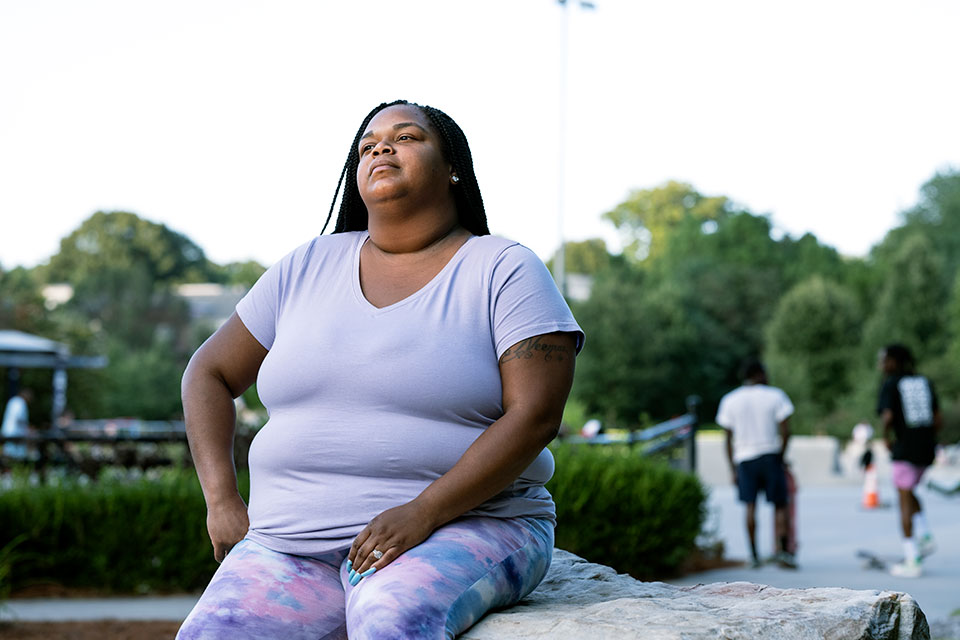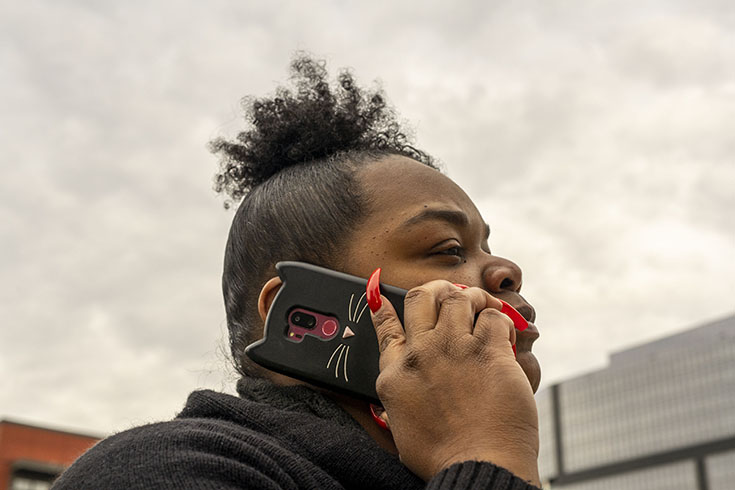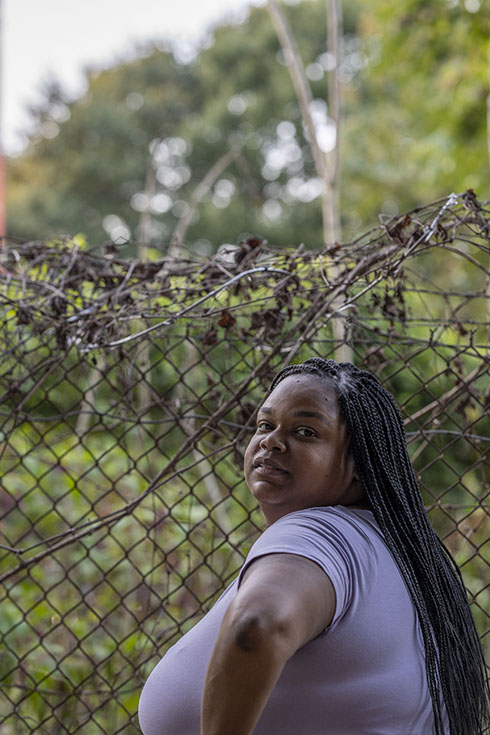S.P.: Provide as much comfort to me and my family as possible

In her mid-thirties, S.P, an African American woman, lives in the Atlanta, Georgia metropolitan area with her partner of seventeen years. She works as a supervisor for an industrial cleaning firm.
Photo Credit: Nydia Blas (all photos)
S.P. grew up surrounded by family in Hampton, Virginia, with cousins, aunts and uncles going in and out of her grandparents’ home. She spent an enormous amount of time with her paternal grandparents in part because the elementary school she attended was directly across the street from the home they owned. Her mother worked as a Certified Nursing Assistant (CNA), as did her grandmother, and her father drove a dump truck. Her grandfather, who was a model of stability for her, operated a backhoe and drove a truck that removed construction rubble.
Early on, S.P. liked school – her third and fifth grade teachers, older women, grandmotherly in orientation, especially won her favor. But her feelings about school changed after her parents divorced. They both remarried, and S.P. moved with her mother, stepfather and half-brother to Georgia. Her mother and stepfather found better paying jobs doing patient care in a hospital setting. She was in the seventh grade and found the big schools strange and uninviting – the youth culture was faster, more sexualized, and less appealing to her. S.P. desperately missed all her kin back in Virginia, especially her grandparents, and felt the isolation of her now nuclear family as they adjusted to a life on their own apart from their community.
 She describes herself as a loner, but someone who has now found her way. She did not get deeply involved in extra-curricular activities until high school when she joined ROTC in her sophomore year. She enjoyed the skills building, order, and clarity of the program. For a brief period of time, she considered a future in the military. However, as she learned more about how the military treats women and people of color, and witnessed how society treats veterans, she decided to follow a different path.
She describes herself as a loner, but someone who has now found her way. She did not get deeply involved in extra-curricular activities until high school when she joined ROTC in her sophomore year. She enjoyed the skills building, order, and clarity of the program. For a brief period of time, she considered a future in the military. However, as she learned more about how the military treats women and people of color, and witnessed how society treats veterans, she decided to follow a different path.
After high school she attended college in Virginia, picking a campus to be close to her extended family. That first year she missed her mother to the point of distraction, worked every weekend at a telemarketing job to support herself, and had trouble focusing on her school work. At the end of the school year she returned to Atlanta, convinced she did not want to go back to college.
She briefly moved home to live with her mother and tried working as a CNA, which she decided she did not want to do. At that juncture, she reconnected with the young woman who had been her best friend in high school and they became lovers and life partners. This shift to a lesbian identity initially drove a wedge between S.P. and her mother, who had a very hard time accepting the relationship. S.P. moved out of the house and into an apartment with her partner. They have now been together for seventeen years. S.P. and her mother have since repaired their relationship, and both S.P. and her partner are key figures in the kin networks in Georgia, often providing support to cousins, S.P.’s stepfather, and other family members.
 A major turning point in her life occurred several years later when her father, who still lived in Virginia, died unexpectedly. It was sudden and shocking. S.P. had just started a new job as a cleaner at a large sports venue and knew she could not ask for time off, even if it was to attend her father’s funeral. Her mother planned to drive north to attend her ex-husband’s service, but, she refused to accommodate S.P.’s schedule, which required that she return to Georgia in time for a night shift. Desperate to be part of the ritual to pay respects and say goodbye to her father, S.P. knew making the journey meant she risked being fired. She had little money, no savings to speak of, and no car of her own. Wracked with guilt and overwhelmed with grief from this loss, she also felt angry at her mother’s unwillingness to help her. She managed to get to Hampton and return in time for work, but it had a long-term impact on her emotionally and financially.
A major turning point in her life occurred several years later when her father, who still lived in Virginia, died unexpectedly. It was sudden and shocking. S.P. had just started a new job as a cleaner at a large sports venue and knew she could not ask for time off, even if it was to attend her father’s funeral. Her mother planned to drive north to attend her ex-husband’s service, but, she refused to accommodate S.P.’s schedule, which required that she return to Georgia in time for a night shift. Desperate to be part of the ritual to pay respects and say goodbye to her father, S.P. knew making the journey meant she risked being fired. She had little money, no savings to speak of, and no car of her own. Wracked with guilt and overwhelmed with grief from this loss, she also felt angry at her mother’s unwillingness to help her. She managed to get to Hampton and return in time for work, but it had a long-term impact on her emotionally and financially.
Three months later, her grandfather, who had been such an instrumental part of her childhood, also died. His death was a huge blow, as S.P. had always seen herself as “granddaddy’s baby.” S.P. felt the fragility of life and had a new awareness that those she loved could pass away without warning. She and her partner felt “like we only have one another” – a lone, poor, and vulnerable. She had gone into debt in order to attend her father’s funeral and their low-wage jobs simply did not pay enough to keep their household going. The electric company cut off their lights, although they were still able to pay the rent. S.P. felt helpless and did not know how to climb out of that hole. It seemed like years before she got back on her feet.
 S.P. is now a supervisor in a large industrial cleaning business hired by warehouses, colleges, and businesses of all kinds. She supervises a large team of employees and is responsible for ordering supplies and organizing schedules. She takes pride in the fact that when someone doesn’t show, she pitches in to work. “I have to get just as dirty and I have to show that teamwork is the way to go.” As a supervisor who has worked many years cleaning, she recognizes the importance of respect for and reciprocity with her coworkers. She knows what it takes to get the work done; she understands the business and does not shirk from any of it. Someday she hopes to own her own cleaning company. Her knowledge of the landscape as well as the ins and outs of staffing signals to her that she has the essential skills for running a successful business.
S.P. is now a supervisor in a large industrial cleaning business hired by warehouses, colleges, and businesses of all kinds. She supervises a large team of employees and is responsible for ordering supplies and organizing schedules. She takes pride in the fact that when someone doesn’t show, she pitches in to work. “I have to get just as dirty and I have to show that teamwork is the way to go.” As a supervisor who has worked many years cleaning, she recognizes the importance of respect for and reciprocity with her coworkers. She knows what it takes to get the work done; she understands the business and does not shirk from any of it. Someday she hopes to own her own cleaning company. Her knowledge of the landscape as well as the ins and outs of staffing signals to her that she has the essential skills for running a successful business.
In the COVID-19 era, the business, while uncertain, has remained steady and even increased as different building environments need more rigorous cleaning. She feels the widespread anxiety about this public health crisis, but worries less for herself and more for the people she loves. Her mother still works as a CNA at a hospital in Georgia.
S.P. does not describe herself as a religious person, but she prays a lot. Her partner is her emotional mainstay, as is her mother, with whom she has been able to mend fences. She tries to squeeze “me time” into her long work week, usually by attending to her hair and getting a manicure or pedicure. In the context of great economic uncertainty, she feels well off because she has people she loves, a job, steady work, and all her bills are paid on time. She is acutely aware that this package is “a luxury that quite a few don’t have” during the pandemic. Ultimately, it is the people in her life that keep her going, and she maintains “hope and faithfulness.” She feels strongly that her successes need to be shared, because “this really don’t mean too much if it’s just me.” She aspires to own land back near her family in Virginia as well as owning a home in Georgia. “The biggest incentive for me to like keep pushing is for me to be able to provide as much comfort to me and my family as possible.”